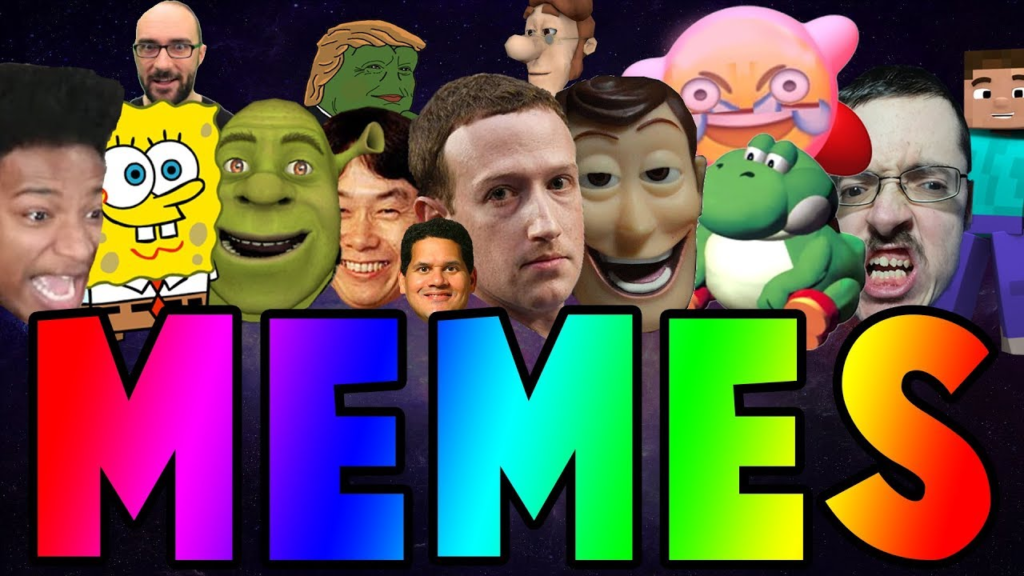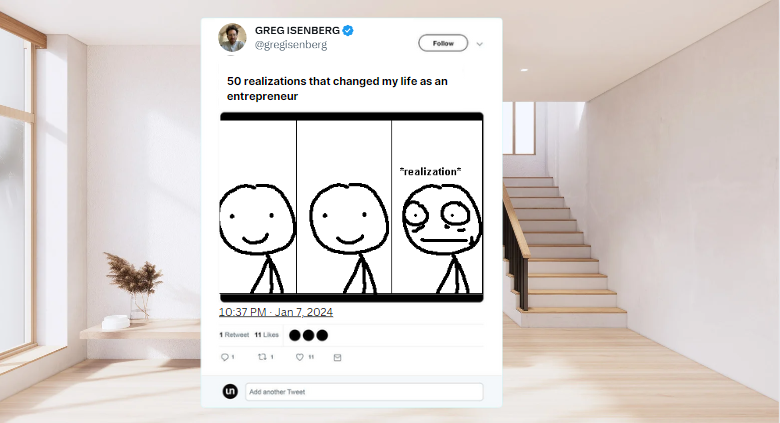Greg Isenberg is a multi-exit Silicon Valley entrepreneur and owner of Late Checkout product studio. He has:
- Headed Product Strategy at WeWork
- Been an advisor to Reddit
- Founded a startup, Islands, which was sold to WeWork
- Founded 5by, which was sold to StumbleUpon
Guest Author: Greg Isenberg
Here are 50 realizations that changed my life as an entrepreneur:
1. Startup valuation is literally a made up number
2. It’s impossible to work with people who don’t answer texts within 24h
3. The internet can be your lottery ticket or your prison sentence
4. If Abercrombie & Fitch can rebrand (up 285% in 2023), then you can rebrand too
5. Having an internet audience is still wildly underpriced
6. Build products that no one asks for but everyone wants
7. It’s actually a good idea to be poor in your 20s and reinvest everything in yourself (learnings, travel, network, figuring out who you are)

8. Google is probably not going to “copy your startup”
9. Content is your salesperson that works for you 24/7
10. Look for opportunities that are low status now, but probably high status in a few years
11. Lifestyle businesses are still massively underrated. You can often turn them into non lifestyle business if you want
12. Avoid dependency on anything. Social apps, VCs etc. Freedom is two words: self-sustaining
13. Taking a break doesn’t mean you’re lazy, burn out is real
14. Whatever you do, don’t be mid-curve
15. The only things that should change your mood are things that will change your life
16. Copycats are a nuisance, not killers. They are usually mosquitoes, not sharks.
17. Good design can’t fix a poor product. But good design can multiply a product that’s working.
18. People follow a journey, not a social account.
19. If you’re doing stuff you hate, you aren’t rich
20. Don’t create a startup without a “why now”
21. Strangers don’t want to hear about you.
They want to talk about themselves or better themselves.
22. The best negotiators talk 10% of the time, and listen 90%
23. Good things happen when you add value to people’s lives through content & community
24. You could learn a lot about someone by their likes on Twitter
25. First find the niche, then learn from the community, then the startup idea will come to you
26. On hiring: if it isn’t a hell yeah, it’s a hell no. Never compromise for fit.

27. Startups never go according to plan. There is no real plan for startups, only a direction
28. The best businesses are the ones that look like a movement. It needs to be an identity, not a product.
29. Your identity is never your company ever. Your company is your business
30. Change scenery 2-3x per day to be extra creative
31. People always want to see behind-the-scenes
32. The happiest people live pretty simple lives, not chasing more and more
33. If there is an active community, there’s a business there
34. Digital businesses beats any laundromat, self-storage or vending machine business (easier, better margins)

Quick break: follow me @gregisenberg for more of this
35. Only create 50+% margin businesses like SaaS, paid communities etc.
36. Cash flow over valuation any day of the week
37. Hire global talent. The world is bigger than NYC or Silicon Valley.
38. You create your own narrative. Narrative drives word-of-mouth which drives revenue which is your oxygen.
39. If something is sold out, customers want it 10x more. Human nature.
40. Diversify cash flow every year. multiple bets, multiple products
41. Selling your first company is an emotional journey
42. Designing rituals into your communities is what brings people back. Remind them to ‘see you tomorrow
43. Being around people who have a clear understanding of what they want from life is refreshing
44. Competitors can copy your products, but can’t copy your community
45. Make friends with people in your industry. Earn their trust. on’t ask for anything for a long time. Overwhelm with value. It’ll payback.
46. Listen to podcasts and take notes. It’s basically like you’re sitting in the room with the world’s greatest founders and entrepreneurs
47. Pick a niche and make a meme page. If you understand the memes, you understand the people. Don’t build until you understand the memes

48. The only audience you have is the audience you own (email, texts, community etc)
49. There’s a fine line between generalist and procrastinator
50. People expect opportunities to come to them. They rarely do. Assume you’re alone and go after it
What are some realizations you’ve had as an entrepreneur, creator, maker etc?
Reply or quote RT to let the people know
Check out the original tweet here.









